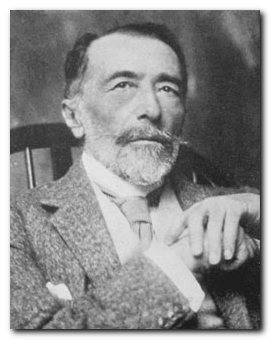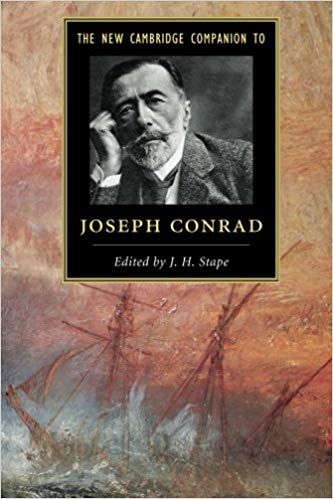annotated bibliography of criticism and comment
Joseph Conrad criticism is a bibliography of critical comment on Conrad and his works, with details of each publication and a brief description of its contents. The details include active web links to Amazon where you can buy the books, often in a variety of formats – new, used, and as Kindle eBooks. The listings are arranged in alphabetical order of author.

The list includes new books and older publications which may now be considered rare. It also includes print-on-demand or Kindle versions of older texts which are much cheaper than the original. Others (including some new books) are often sold off at rock bottom prices. Whilst compiling these listings I bought a copy of Jeremy Hawthorn’s early study Joseph Conrad: Language and Fictional Self-Consciousness for one penny.
Joseph Conrad and the Reader – Amar Acheraiou, London: Macmillan, 2009. This challenging study proposes new approaches to modern literary criticism and is fully devoted to Conrad’s relation to the reader, visual theory and authorship.
Joseph Conrad: The Major Phase – Jacques Berthoud, Cambridge: Cambridge University Press, 1978. A demonstration of the clarity, consistency, and depth of thought evident in Conrad’s novels written during the first decade of the twentieth century.
Joseph Conrad: Poland’s English Genius – Muriel Bradbrook, Cambridge: Cambridge University Press, 1941. A brief study of the life and work with stories considered in three main themes: the wonders of the deep, the hollow men, and recollections in tranquillity.
Joseph Conrad (Bloom’s Modern Critical Views) – Harold Bloom (ed), New York: Chelsea House Publishers, 2010. A new selection of contemporary critical commentary, plus a bibliography and a chronology of Conrad’s life.
An Autobiography of Joseph Conrad – Stephen Brennan, Skyhorse Publishing, 2014. Scenes from Conrad’s memoirs and non-fictional writing stitched together to showcase some of the more exciting and trying times in the novelist’s life.
Joseph Conrad and Psychological Medicine – Martin Bock and Robert Hampson, Texas Tech Press, 2002. Revises our understanding of Conrad’s life, and rethinks the dominant themes of his work in light of pre-Freudian medical psychology.
Joseph Conrad: The Way of Dispossession – Hillel M. Daleski, Holmes & Meier, 1977.
Joseph Conrad and Popular Culture – Stephen Donovan, London: Palgrave Macmillan, 2005. An analysis of Conrad’s relation to Victorian and early twentieth century popular culture. Illustrated summaries of the development of specific popular cultural forms—songs, early cinema, magazines, advertising, and tourism—underpin fresh readings of Conrad’s central works.
Joseph Conrad: The Imagined Style – Wilfred S. Dowden, Vanderbilt University Press, 1970. Analyzes the evolution of Conrad’s style and vision of imagery through a study of his novels and short stories.
Joseph Conrad and the Modern Temper – Daphna Erdinast-Vulcan, Oxford: Oxford University Press, 1991. A study that relates Conrad’s work to the crisis of modernity in the late nineteenth century, and discusses ‘faultlines’ – ambiguities and apparent aesthetic ruptures – in nine of the major novels and novellas.
Coercion to Speak: Conrad’s Poetics of Dialogue – Aaron Fogel, Cambridge, Mass: Harvard University Press, 1985. Fogel shows how Conrad shaped ideas and events and interpreted character and institutions by means of dialogues representing not free exchange but various forms of forcing another to respond.
Joseph Conrad: Comparative Essays – Adam Gillon and Raymond Brebach, Texas Tech Press, 1993. Gillon examines the affinities between Conrad’s descriptive art and both painting and film.
Joseph Conrad: The Making of a Novelist – John Dozier Gordon, Cambridge, Mass: Harvard University Press, 1940.
Conrad, Language, and Narrative – Michael Greaney, Cambridge University Press, 2001. Challenges old assumptions and engages current controversies in revelatory and rich close readings.
Conrad the Novelist – Albert J. Guerard, Cambridge, Mass: Harvard University Press, 1958.
Joseph Conrad: Betrayal and Identity – Robert Hampson, Basingstoke: Palgrave Macmillan, 1992. Traces the development of Conrad’s conception of identity through the three phases of his career: the self in isolation, the self in society, and the sexualised self.
The Theatre of Joseph Conrad: Reconstructed Fictions – Richard J. Hand, London: Palgrave Macmillan, 2005.
One of Us: Mastery of Joseph Conrad – Geoffrey Galt Harpham, Chicago University Press, 1997. Conrad has traditionally been viewed as an admirable master: master mariner, storyteller, and writer. But his reputation has been linked in recent years to the negative masteries of racism, imperialism, and patriarchy.
Joseph Conrad: Language and Fictional Self-Consciousness – Jeremy Hawthorn, London: Edward Arnold, 1979. This book explores the interplay between technical accomplishment and artistic conception in Conrad’s work, addressing the question why some of Conrad’s novels are acknowledged masterpieces and others ‘incomplete successes’.
Joseph Conrad: Narrative Technique and Ideological Commitment – Jeremy Hawthorn, London: Hodder Arnold, 1992. This study argues that technical skills can be refined but these have to be complemented by a larger vision and commitment – “a conception of the whole” – otherwise it does not result in great art.
Sexuality and the Erotic in the Fiction of Joseph Conrad – Jeremy Hawthorn, London: Continuum, 2007. This book will open Conrad’s fiction to readings enriched by the insights of critics and theorists associated with Gender Studies and Post-colonialism.
Essays on Conrad – Frank Kermode (ed), Cambridge University Press, 2000. A series of critical studies written by Ian Watt, and edited by Frank Kermode.
The Oxford Reader’s Companion to Conrad – Owen Knowles, Oxford: Oxford University Press, 2001. Background study materials to all the major works – chronologies, critical essays, maps, bibliographies, and the development of Conrad’s critical reputation.
Conrad’s Narrative Method – Jakob Lothe, Ohio State University Press, 2008. This structuralist study of narrative is the first book-length attempt to apply recent developments in critical theory and practice to the whole canon of Conrad’s works.
Joseph Conrad – Tim Middleton, London: Routledge, 2006. A student’s introductory guide to Conrad, his life and work, with a chronology and suggestions for further reading
The Polish Shades and Ghosts of Joseph Conrad – Gustav Morf, New York: Astra Books, 1976.
Conrad Revisited: Essays for the Eighties – Ross Murfin, Tuscaloosa, Ala: University of Alabama Press, 1985.
Joseph Conrad: A Biography – Jeffery Myers, Cooper Square Press, 2001. This claims to be the definitive biography – but some readers disagree.
Joseph Conrad: A Life – Zdzislaw Najder, Camden House, 2007. This too is tipped as the definitive biography, because Najder’s command of English, French, Polish, and Russian allowed him access to a greater variety of sources than any other biographer, and his Polish background and his own experience as an exile have afforded him a unique affinity for Conrad and his milieu.
The French Face of Joseph Conrad – Lindsay Newman and Yves Hervouet, Cambridge: Cambridge University Press, 1990. This study presents the French face of Conrad’s work, and demonstrates that his knowledge of the French language and its literature (which preceded his acquisition of the English language) has profound implications for the study of the novels.
Joseph Conrad Today – Kieron O’Hara, Imprint Academic, 2007. Argues that Conrad’s scepticism, pessimism, emphasis on the importance and fragility of community, and the difficulties of escaping our history are important tools for understanding the political world in which we live.
Joseph Conrad: His Moral Vision – George A. Panichas, Mercer University Press, 2005. The book shows that morality in Conrad’s work is not reducible to an absolute category but must be apprehended in the forms of both moral crises and the possibility of moral recovery enacted in their complexity and tensions.
The Cambridge Introduction to Joseph Conrad – John G. Peters, Cambridge: Cambridge University Press, 2006. This introduction is aimed at students coming to Conrad’s work for the first time. It covers Conrad’s themes of travel, exploration, and racial and ethnic conflict.
A Historical Guide to Joseph Conrad – John G. Peters, Cambridge: Cambridge University Press, 2006. Original essays showcase the abundance of historical material Conrad drew upon, and how he mined his early life as a sailor to create scathing indictments of colonialism and capitalist cupidity.
– Joseph Conrad: Voice, Sequence, History, Genre – James Phelan, Ohio State University Press, 2008.
Homosexuality in the Life and Work of Joseph Conrad: Love Between the Lines – Richard J. Ruppel, London: Routledge, 2009. Conrad’s recurrent bouts of neurasthenia, his difficult courtships, late marriage, and frequent expressions of misogyny can all be attributed to the fact that Conrad was emotionally, temperamentally, and, perhaps, even erotically more comfortable with men than women.
Joseph Conrad and the Fiction of Autobiography – Edward Said, Cambridge Mass: Harvard University Press, 1966. Said argues that Conrad, who set his fiction in exotic locations like East Asia and Africa, projects political dimensions in his work that mirror a colonialist preoccupation with ‘civilizing’ native peoples.
Joseph Conrad: The Critical Heritage – Norman Sherry, London: Routledge & Keegan Paul, 1973. A collection of reviews and essays tracing the development of Conrad’s critical reputation as a novelist.
Joseph Conrad: (Critical Issues) – Allan H. Simmons, London: Palgrave Macmillan, 2006. First-time readers of Conrad are provided with in-depth contexts for appreciating a writer whose work is often challenging, while readers already familiar with Conrad’s fiction will find new perspectives with which to view it.
Joseph Conrad In Context – Allan H. Simmons, Cambridge University Press, 2014. This book examines the biographical, historical, cultural and political contexts that fashioned Conrad’s works. Each short chapter covers a specific theme in relation to Conrad’s life and his fiction.
The New Cambridge Companion to Joseph Conrad – J.H. Stape, Cambridge: Cambridge University Press, 2014. Thirteen chapters offer diverse perspectives on emergent areas of interest, including canon formation, postcolonialism, gender, critical reception and adaptation.
The Several Lives of Joseph Conrad – John Stape, Arrow Books, 2008. A biography that puts its emphasis on Conrad’s life, rather than his work.
Joseph Conrad: Master Mariner – Peter Villiers, Seafarer Books, 2006. A biographical study which traces Conrad’s career as a sailor, and looks at the places he visited in relation to their depiction in his stories and novels.
Conrad in the Nineteenth Century – Ian Watt, London: Chatto and Windus, 1980. Close readings of the novels, full of quotes, detailed analysis and an acute explanation of the major themes of Conrad’s narratives.
Joseph Conrad: (Writers and their Work) – Cedric Watts, London: Northcote House, 1994. Explores Conrad’s importance and influence as a moral, social, and political commentator
Joseph Conrad and the Adventure Tradition – Andrea White, Cambridge University Press, 2008. A study showing how Conrad demythologized and disrupted the imperial subject constructed in earlier writing, and arguing that the very complexity of Conrad’s work provided an alternative, and more critical, means of evaluating the experience of empire.
© Roy Johnson 2015
More on Joseph Conrad
Twentieth century literature
More on Joseph Conrad tales
